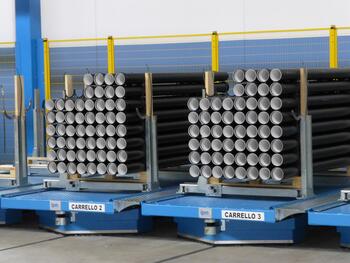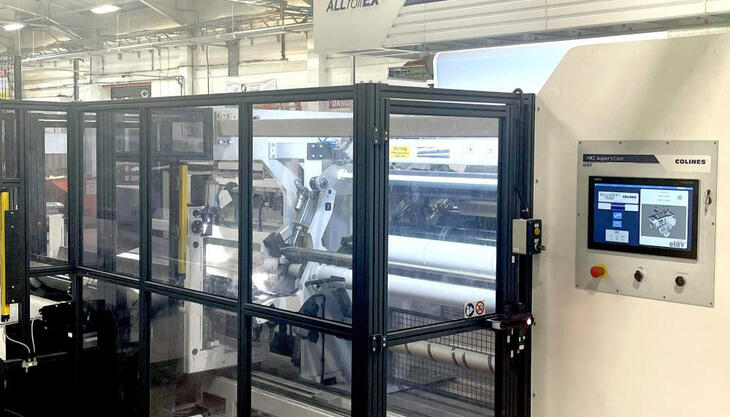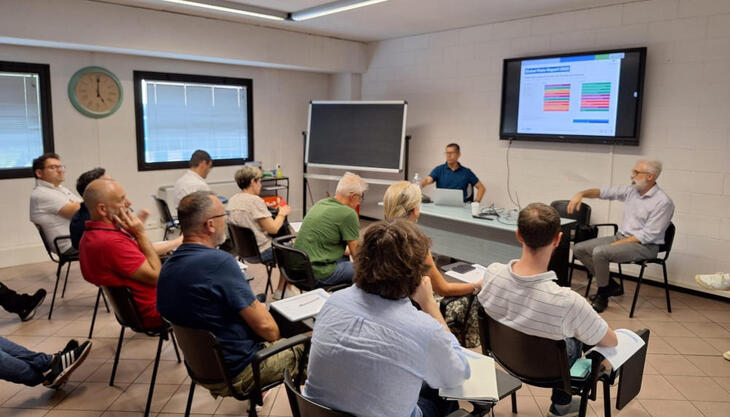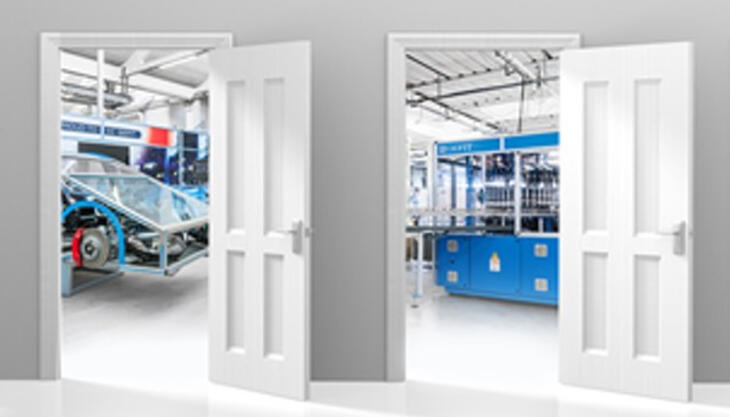A high level of automation

Market competitiveness is now coming to depend, more and more, on the end of the extrusion line, because the production capacity of the extruder is directly proportional to the capacity of the end-of-the line machines to process the different quantities and types of pipes produced. When producing short pipe lengths (for PP pipes, for example), efficient functioning of the saw, belling machine and automatic packaging plant (when present) is crucial. For many years, IPM invested a great deal in this direction, trying to make the end of the line better and better performing, so as to allow the production capacity of the extruder to be exploited to the full, while maintaining the high quality of the pipe produced.
Reaffirming this concept, at K 2016 in Düsseldorf (stand D58, hall 16) the Italian company IPM presents a range of technologically advanced and fully automatic machines. First of all, a high-speed electronic socketing machine of the Rieber System type (socket with contemporaneous insertion of the gasket), covered by two patents. This machine automatically tests each pipe produced, rejecting any socket that is nonconforming or defective. Thanks to a further patented technology, IPM is able to ensure the repeatability of the production cycle, and consequently the production in series of the socket type that has been set, self-adjusting whenever, for whatever reason, there are changes in the conditions initially set, e.g., changes in the external temperature (winter/summer), damage to heating resistances, pipe cooling, and so on.
To control the machine, Siemens latest generation touchscreen panels, offering the best performances in terms of speed and visual indicators of efficiency and energy consumption, provide an immediate snapshot of the performance of the machine. In addition, following the advent of broadband and exploiting the increasing use of company networks (wired or wireless), a teleservice system makes it easier to interface with customers from all over the world.
In addition, at K 2016, IPM exhibits a line for PP pipes, comprising a cutting group and socketing machine, that encapsulates years of research and development in this field. Depending on the pipe to be produced, IPM is able to design and automate the entire process, by inserting robots and specific machines, capable of producing the type of packaging that the customer requires, even involving very diverse technologies, but always with the purpose of reducing, if not eliminating, the presence of the operator on the extrusion line, limiting his intervention to the withdrawal of the pallets that have been formed and packed, ready for storage.
Since a human eye check on the suitability of extruded pipes is no longer expected, the company has developed and patented a device for testing, directly in line, each individual pipe’s quality and compliance with tolerances (a patented innovation, presented at the fair). With more automation, it also decreases rejection rates, thanks to the precision of the controls, that are no longer only random checks. The result is that, using these automated packaging plants, processors can today pack up to 1500 pipes/hour, continuously, 24 hours a day.
Finally, visitors to the IPM stand can see a CT63 automatic high production pipe bending machine (up to about 800 bends/hour). At the fair, it simultaneously produces four bends per cycle, with a 90° angle, socketed at both ends. The product obtained is extremely precise, and shows no crushing, ovalization or warping. The machine also offers the possibility of obtaining bends with different angles, up to 90°. IPM is currently one of the few manufacturers worldwide producing the largest range of these plants, able to bend and socket pipes with diameters of between 16 mm and 500 mm, with multiple bending radiuses and angles.
Reaffirming this concept, at K 2016 in Düsseldorf (stand D58, hall 16) the Italian company IPM presents a range of technologically advanced and fully automatic machines. First of all, a high-speed electronic socketing machine of the Rieber System type (socket with contemporaneous insertion of the gasket), covered by two patents. This machine automatically tests each pipe produced, rejecting any socket that is nonconforming or defective. Thanks to a further patented technology, IPM is able to ensure the repeatability of the production cycle, and consequently the production in series of the socket type that has been set, self-adjusting whenever, for whatever reason, there are changes in the conditions initially set, e.g., changes in the external temperature (winter/summer), damage to heating resistances, pipe cooling, and so on.
To control the machine, Siemens latest generation touchscreen panels, offering the best performances in terms of speed and visual indicators of efficiency and energy consumption, provide an immediate snapshot of the performance of the machine. In addition, following the advent of broadband and exploiting the increasing use of company networks (wired or wireless), a teleservice system makes it easier to interface with customers from all over the world.
In addition, at K 2016, IPM exhibits a line for PP pipes, comprising a cutting group and socketing machine, that encapsulates years of research and development in this field. Depending on the pipe to be produced, IPM is able to design and automate the entire process, by inserting robots and specific machines, capable of producing the type of packaging that the customer requires, even involving very diverse technologies, but always with the purpose of reducing, if not eliminating, the presence of the operator on the extrusion line, limiting his intervention to the withdrawal of the pallets that have been formed and packed, ready for storage.
Since a human eye check on the suitability of extruded pipes is no longer expected, the company has developed and patented a device for testing, directly in line, each individual pipe’s quality and compliance with tolerances (a patented innovation, presented at the fair). With more automation, it also decreases rejection rates, thanks to the precision of the controls, that are no longer only random checks. The result is that, using these automated packaging plants, processors can today pack up to 1500 pipes/hour, continuously, 24 hours a day.
Finally, visitors to the IPM stand can see a CT63 automatic high production pipe bending machine (up to about 800 bends/hour). At the fair, it simultaneously produces four bends per cycle, with a 90° angle, socketed at both ends. The product obtained is extremely precise, and shows no crushing, ovalization or warping. The machine also offers the possibility of obtaining bends with different angles, up to 90°. IPM is currently one of the few manufacturers worldwide producing the largest range of these plants, able to bend and socket pipes with diameters of between 16 mm and 500 mm, with multiple bending radiuses and angles.


















